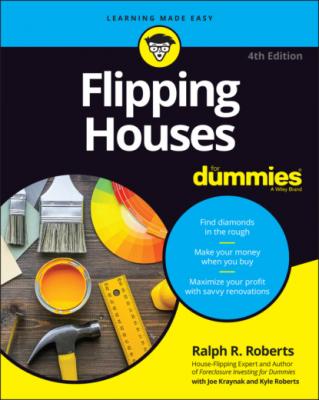Flipping Houses For Dummies. Ralph R. Roberts
Читать онлайн.| Название | Flipping Houses For Dummies |
|---|---|
| Автор произведения | Ralph R. Roberts |
| Жанр | Недвижимость |
| Серия | |
| Издательство | Недвижимость |
| Год выпуска | 0 |
| isbn | 9781119861034 |
Recruiting Moneymen (and Women)
Flipping properties for a profit is all about money — getting it, spending it, paying taxes on it, and using it for your next flip. To succeed, you need someone who’s good at managing the finances while you’re busy buying, rehabbing, and selling. Actually, you may need at least three people who are good with money — one or more to loan you money, a second to help you manage it and save on taxes, and a third to recommend the best way to invest it. The following sections describe the types of financial assistance you need.
Finding financiers
Unless you’re independently wealthy, you need a source of cash to get started. You may be able to tap into your savings account, mortgage your home, and max out your credit card, but strong financial backing from investors can provide you with the capital you need to leverage your personal investment. The big question is this: Who can you ask for investment capital? Here’s a list to get you started:
Start with your friends and family and your attorney. They already know you, and charity begins at home.
Tell everyone you meet that you flip houses. An investor may hear about it and contact you but be careful — an investor may be looking for a newbie to snooker into a raw deal. Question any deal that requires you to take on an inordinate share of the risk.
Contact doctors, lawyers, dentists, and other highly paid professionals you know who may be looking to improve the return on their investments.
You have two options for financing your flips with other people’s money (OPM): Borrow the money (and typically pay interest on it), or partner with the person and split the profits. Either option will cost you money, but both options enable you to move forward on deals you would otherwise lose. When using OPM, invest it in line with your lender’s or partner’s expectations — no bait and switch!
If you contact everyone you know and you’re still short on cash, consider approaching a hard-money lender. Hard money is typically a short-term, high-interest loan. In Chapter 4, I discuss various types of loans, including hard money, and I provide more information on securing the financing needed to flip properties.
Hiring an accountant
Most of the accounting that applies to house flipping consists of simple addition and subtraction. Add up the total cost of buying, renovating, and selling the house, and then subtract it from the amount you receive when you sell the house. If you come up with a positive number, you made money.
Unfortunately, reality is a little more complex, and having a professional accountant on call can help you avoid unnecessary expenses and legal woes. This person can take all your money and receipts out of your shoebox, sort them, and figure out whether you made any money. If you did make money, the accountant can calculate the amount of tax you owe. An experienced accountant also delivers the following services:
Saves you money on income tax while remaining in compliance with complex IRS tax laws. Section 179 of the IRS tax law is a good example: It states that if you qualify, you can expense as much as $25,000 of a vehicle if it weighs between 6,000 and 14,000 pounds. I did this in 2015 to take advantage of Section 179. I was able to write off and depreciate $25,000 of the total cost of the vehicle in the first year, giving me a large savings on taxes. These opportunities are out there for you to take advantage of if you are (or your accountant is) savvy enough to catch them. (See Chapter 23 for more about tax issues.)
Reminds you to pay your property taxes on time.
Evaluates your house flipping activity to determine whether you’re considered an investor or a self-employed dealer.
Makes sure you pay your quarterly estimated taxes if you’re considered a self-employed dealer.
Ensures that you pay your quarterly estimated taxes on your capital gains if you’re considered an investor.
Offers a sanity check to make sure your grand vision for the house doesn’t blow your budget.
My first two CPAs didn’t work out when I was first starting out. My third CPA came through a mutual friend of mine who was a CPA and CFO of a successful company. He had a friend with an independent CPA practice. The rest is history. I’ve been using this CPA ever since — for the past 30 years.
Obtaining sound investment advice
When the money starts rolling in, your first impulse may be to roll your profits into your next flip, but that’s not always the savviest approach. You may want to sock away some money in tax deferred accounts to save on taxes and protect your gains. A knowledgeable financial advisor can provide the advice you need to make the best use of your profits.
Covering Your Back with Title and Homeowner’s Insurance
When you sign on the dotted line to purchase a property, you own not only the property but also all the problems associated with it. Buy a property from someone who’s facing foreclosure, and you may just own a property that has one or more liens against it — legal claims against the property to secure a debt. (See Chapter 7 for more information about foreclosures and Chapter 9 for guidance on how to research a property.)
To avoid unforeseen problems associated with the title of a property you’re about to purchase, carefully research the title history, as explained in
